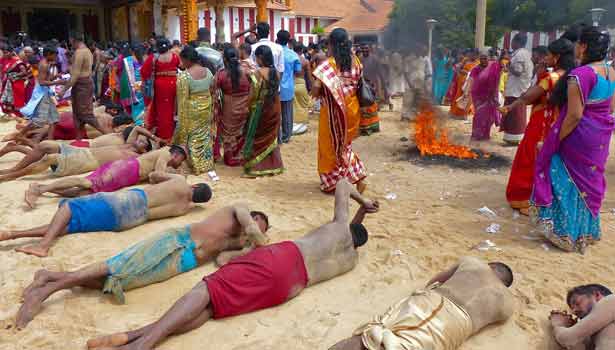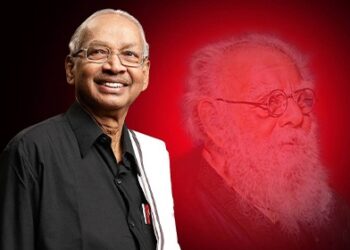On May 17, the Madurai Bench of the Madras High Court allowed the resumption of “annadhanam” (offering free food) and “angapradakshanam” (circumambulation) at the final resting place of Nerur Sathguru Sadasiva Brahmendral on the eve of his Jeeva Samathi day. The practice of doing ‘angapradakshanam’ by rolling on the plantain leaves left behind by devotees after eating food from them, in the belief that it would offer spiritual benefit, had been in vogue for over 100 years. However, it was halted by a Division Bench order in a public interest litigation (PIL) petition in 2015.
Nine years later, Justice G.R. Swaminathan reinstated the practice by invoking Article 25(1) of the Constitution that guarantees the right to freely profess, practise, and propagate religion. The judge linked the belief of the devotees, who claim to derive spiritual benefit from such practice, to the right to privacy, a fundamental right under the Constitution. He argued that if the right to privacy includes “gender and sexual orientation”, it also includes “spiritual orientation”. “It should not affect the rights and freedoms belonging to others. So as long as this Rubicon is not crossed, it is not open to the State or the courts to impinge on one’s action,” he said.
The judge overlooked the people’s movement that culminated in the judicial decisions that recognised sexual orientation, which cannot be equated with a spiritual orientation, especially as angapradakshanam on the plantain leaves left behind by devotees is customary and religious rather than spiritual. He cited the Mahabharata to support his decision, arguing that spiritual benefits are conferred by rolling on leftover food. He sums it up by holding that the customary practice is protected as a fundamental right under Articles 14, 19(1)(a), 19(1)(d), 21 and 25(1) of the Constitution.
Justice Swaminathan overruled the Division Bench’s order on the ground that the devotees and the trustees of the Adhistanam, who were the necessary parties in the PIL petition, were neither included as parties nor heard and held the order to be a fallacy as it suffered from an egregious breach of the principles of natural justice.
The Division Bench order noted that all devotees irrespective of their castes indulged in the practice of rolling on the left over plantain leaves. It concluded that such religious and customary practices affect human dignity and violate the rights of equality and life under Articles 14 and 21 of the Constitution. Despite the voluntary acts of the devotees, the court ordered the practice to be stopped immediately in 2015. The Division Bench relied on a case from Karnataka that is pending in the Supreme Court, where a similar practice was performed at the Kukke Subramanya temple in Dakshina Kannada district. The Supreme Court stayed the practice in December 2014 and directed the respondents therein not to allow anyone to roll on leftover plantain leaves.
Justice Swaminathan negates the Supreme Court order noting that the Karnataka case involved only Brahmins’ left overs that persons of other communities rolled over, while in the present case, all devotees participated irrespective of their community. He observed that “in fact, the custom on hand points to communal amity and social integration”.
The reasoning is due to the erroneous understanding of the facts in the Supreme Court case, which arose on an appeal from the Division Bench of the Karnataka High Court. Before the Division Bench, the respondents agreed that the rolling on plantain leaves ceremony would be open to all persons, and said that they would discontinue the practice of the Brahmin community alone eating the food offered to the deity as ‘naivedyam’. They also said that the food served on the plantain leaves would not have been tasted or partially eaten. It would be placed in the outer yard over which willing devotees could perform the ritual. The appeal in the Supreme Court was by the State of Karnataka which was stayed as the rituals were against public order, morality, and health, which are the restrictions on the right to worship under Article 25(1) of the Constitution.
Justice Swaminathan’s Judgment focused on the devotee’s rights to continue with the ritual under the pretext of protection of their fundamental rights. However, it failed to examine the duty of every citizen to develop a scientific temper, humanism and the spirit of inquiry and reform enshrined in the Constitution.
Existing conflict
At the heart of the judgment is the conflict between cultural relativism and universalism. The universalists argue for adoption of human rights standards, whereas the cultural relativists rely on customary laws and practices and religious beliefs. The judge has chosen the relativist argument and has moved away from the norms in international instruments, where the Preamble of the Charter of the United Nations and the Universal Declaration of Human Rights mention human dignity. The judge failed to recognise that traditional and religious practices are steeped in superstitious beliefs and are the refuge of the ignorant and fearful, who guard against the challenge to their privileges.
It is the duty of the state to change religious and customary practices, such as rolling over left overs, that are unhealthy, harmful, and a strike at human dignity. While an outright rejection of such practices may open up a Pandora’s Box, the State could educate the believers through reason and rational discussions and pave for a community that is humane and prone to the spirit of inquiry.
Courtesy: ‘The Hindu’








